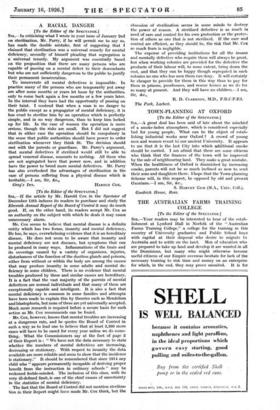[To the Editor of the SPECTATOR.] SIR,—If the article by
Mr. Harold Cox in the. Spectator of December 12th induces its readers to purchase and study the Eleventh Annual Report of the Board of Control it may do much good. If, on the other hand, its readers accept Mr. Cox as an authority on the subject with which he deals it may cause unnecessary alarm.
Mr. Cox seems to believe that mental disease is a definite
entity which has two forms, insanity and mental deficiency. He has, he says, overwhelming evidence that it is an hereditary disease. He does not seem to be aware that insanity and mental deficiency are not diseases, but symptoms that can be produced in many ways. Inflammations of the brain and its coverings caused by a variety of organisms, injuries, disturbances of the function of the ductless glands and poisons, either from without or within the body are among the causes that may produce insanity in some adults and mental de- ficiency in some children. There is no evidence that mental troubles produced by these and similar causes are hereditary. It is a fact that the vast majority of the parents of mental defectives are normal individuals and that many of them are exceptionally capable and intelligent. It is also a fact that mental deficiency is common in some families and attempts have been made to explain this by theories such as Mendelism and blastophoria, but none of these are yet universally accepted. Muchmore research is required before a secure basis for such action as Mr. Cox recommends can be found.
Mr. Cox, however, knows that mental troubles are increasing
at a dangerous ,rate, and he quotes the Board of Control in Bitch a way as to lead one to believe that at least 2,500 more cases will have to be cared for every year unless we do some- thing. - What the Commissioners say at the foot of page 2 of their-Report.is : ""We have not the data necessary to state whether the numbers of mental defectives are increasing, decreasing or stationary. With respect to insanity the data available are more reliable and seem to show that the incidence is stationary." It should be remembered that since 1914 any child who " appears permanently incapable of deriving proper benefit from the instruction in ordinary schools " may be
reckoned feeble-minded. The inclusion of this class, with its very ill-defined limit, is one of the chief causes of uncertainty in the statistics of mental deficiency.
The fact that the Board of Control did not mention steriliza- tion in their Report might have made Mr. Cox think, but the obsession of sterilization seems in some minds to destroy the power of reason. A sterilized defective is as much in need of care .and control for his own protection or the protee! tion of others as one that is not sterilized. If the care and control are efficient, as they should. be, the risk that Mr. Cox so much fears is negligible.
The expense of providing institutions for all the insane and mentally defective who require them will always be great, but when working colonies are provided for the defective the products of their labour will, to some extent, bring down the cost, and that they can be happy though segregated in such colonies no one who has seen them can deny. It will certainly be cheaper to provide for them in this way than to pay for them in prisons, poorhouses, and rescue homes as we do for so many at present. And they will have no children.—I am, Sir, &c.,














































 Previous page
Previous page